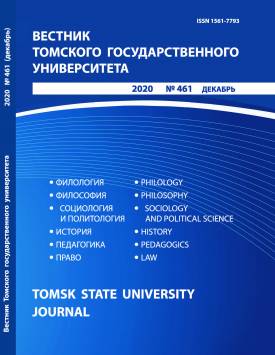Plato's Doctrine of the Immortality of the Soul and the Ancient Indian Mythological and Religious Tradition: On the Problem of Cross-Cultural Interaction
In the article, the problem of the potential influence of the ancient Indian mytho-religious tradition on Plato's doctrine about the immortality of the soul is considered in the framework of comparative methodology. The author suggests going beyond the Eurocentric disputes taking place in philosophical comparative studies and focusing on the uniform problem field in which the philosophical thought of Plato and of the authors of old Indian religious and philosophical texts lived. The study of the indicated problem is limited to the initial stage of the development of Indian philosophy. It is explained by the author's methodological approach: to compare objects of one sort approximately coincident chronologically. The main points in the evolution of the concept "soul" in the religious and philosophical tradition of India and in Plato are noted. On the basis of the comparative analysis of approaches to the essence of an individual soul and forms of its immortality in the context of the ontological, cosmological, epistemological, ethical, eschatological aspects of Plato's philosophy and the pre-philosophical ideas contained in the religious texts of ancient India, typological and conceptual parallels in doctrines about the immortality of soul and also a number of fundamental differences are established. The author makes a short historical review of comparative studies on the issue of the interaction and interference of different cultural traditions and the influence of eastern religious wisdom on Plato's philosophy. The author notes that attempts to resolve the issue of influence mechanisms, channels of broadcasting the corresponding knowledge and the very need for borrowing in these studies did not to lead to a specific result. On the basis of ancient authors' writings, the picture of contacts of ancient Greeks with Indians is reconstructed. Information about India of Plato's time is limited. The author pays attention to the problem of a language barrier when borrowing or transmitting philosophical ideas. He gives examples of how the character and content of education, the mental outlook and the ethnocultural identity of the ancient Greek influence the understanding and acceptance of the religious and philosophical ideas. The closed nature of sources and oral transfer of knowledge in ancient Indian religious tradition were a serious barrier for strangers in receiving this knowledge. The author notes that the existence of contacts between representatives of different religious or philosophical traditions does not offer an opportunity for them to influence one another; the intracultural mechanism of processing and assimilation of information obtained through contacts is necessary for this purpose. The conclusion is drawn about Plato's intellectual independence and creative originality in the creation of his doctrine on the immortality of the soul, and about the philosopher's adaptation of ancient archetypal principles for the doctrine.
Keywords
immortality of soul, Atman-Brahman, mytho-religious consciousness, universal symbols, archetypes, cross-cultural interaction, EurocentrismAuthors
| Name | Organization | |
| Pozdnyakov Sergey N. | missan75@mail.ru |
References

Plato's Doctrine of the Immortality of the Soul and the Ancient Indian Mythological and Religious Tradition: On the Problem of Cross-Cultural Interaction | Vestnik Tomskogo gosudarstvennogo universiteta – Tomsk State University Journal. 2020. № 461. DOI: 10.17223/15617793/461/9
